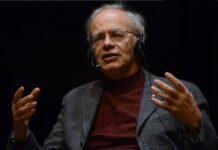Nekaj odlomkov in zanimivega sestavka o pomenu filozofije v šoli:
How should educationalists prepare young people for civic and professional life in a digital age? Luddite hand-wringing won’t do. Redoubling investment in science, technology, engineering and maths (Stem) subjects won’t solve the problem either: hi-tech training has its imaginative limitations.
In the near future school-leavers will need other skills. In a world where technical expertise is increasingly narrow, the skills and confidence to traverse disciplines will be at a premium. We will need people who are prepared to ask, and answer, the questions that aren’t Googleable: like what are the ethical ramifications of machine automation? What are the political consequences of mass unemployment? How should we distribute wealth in a digitised society? As a society we need to be more philosophically engaged. …
If educators assume philosophy is pointless, it’s fair to say that most academic philosophers (unlike, say, mathematicians, or linguists) are still territorial, or ignorant, about the viability of their subject beyond the cloisters. If educators need to get wise, philosophers need to get over themselves.
Thinking and the desire to understand don’t come naturally – contrary to what Aristotle believed. Unlike, say, sex and gossip, philosophy is not a universal interest. Bertrand Russell came closer when he said, “Most people would rather die than think; many do.” While we may all have the capacity for philosophy, it is a capacity that requires training and cultural nudges. If the pursuit of science requires some cognitive scaffolding, as American philosopher Robert McCauley argues, then the same is true of philosophy.

















